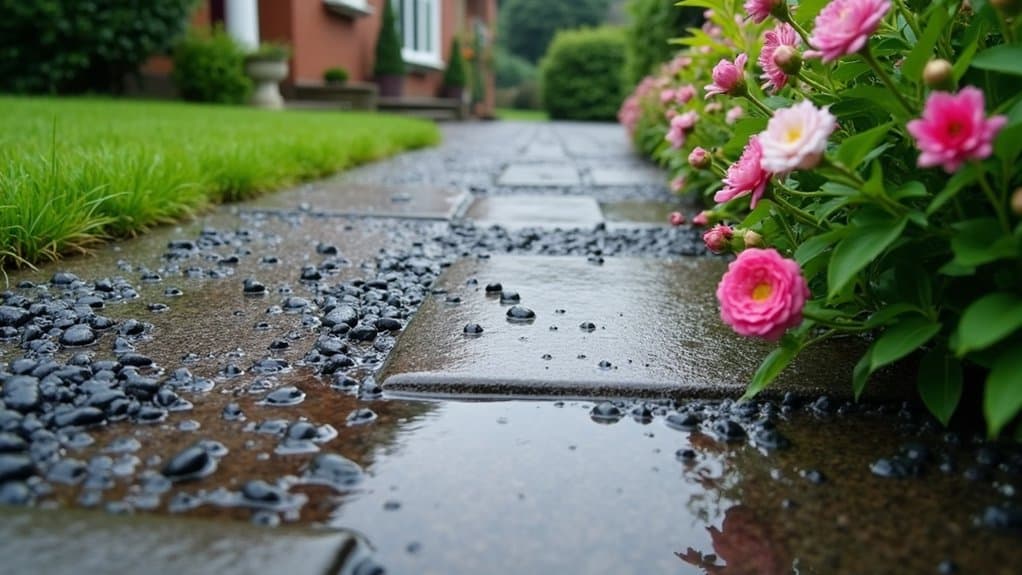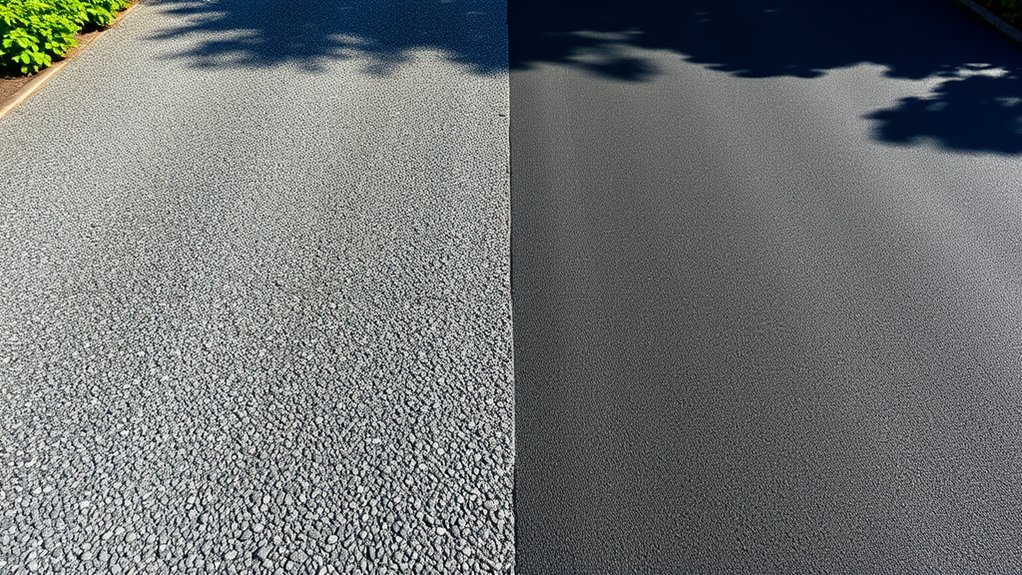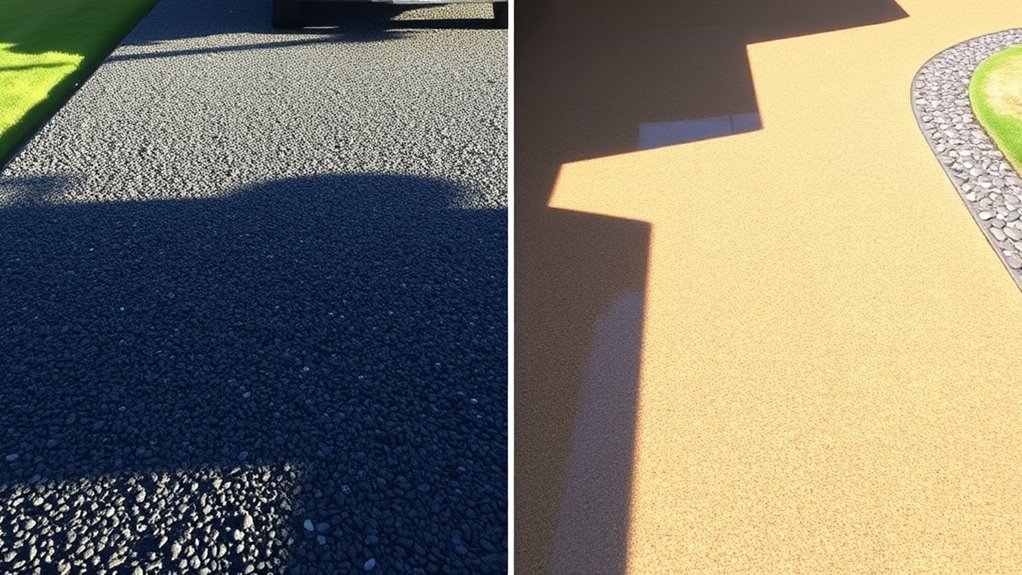If you’re seeking the best driveway material for handling UK rain, consider permeable options like resin-bound or gravel driveways. These materials allow water to seep through, reducing runoff and the risk of flooding. In contrast, traditional choices like concrete and tarmac can lead to water pooling and drainage issues.
Resin-bound driveways are not only eco-friendly but also offer a variety of design options. Gravel driveways, on the other hand, provide quick installation and are budget-friendly. Explore these materials further to find the right fit for your needs.
Table of Contents
ToggleKey Takeaways
- Gravel driveways are very permeable, allowing rainwater to drain effectively and reducing surface runoff during heavy downpours.
- Resin-bound driveways let rainwater seep through, which helps comply with sustainable drainage regulations (SuDS) and minimises flooding.
- Tarmac’s layered design improves drainage and prevents water pooling, but it needs proper grading and regular maintenance to work well in wet weather.
- Permeable concrete is an eco-friendly choice that reduces water runoff and filters pollutants, although it does come with higher carbon emissions.
- Asphalt is tough and can handle heavy rainfall, but it requires good drainage and prompt repairs to keep it effective.
Understanding Rainfall Impact on Driveways
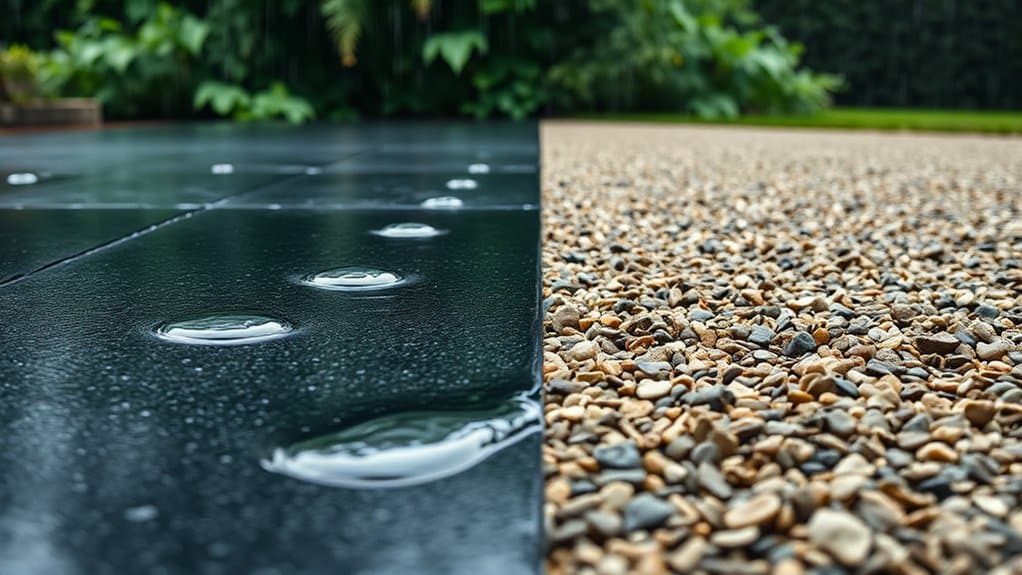
Rainfall intensity varies across the UK, so it’s vital to understand how it affects driveway materials and drainage systems.
In areas with high rainfall intensity, like Southeast England, effective drainage solutions are crucial to handle quick water accumulation. In contrast, regions like Northern Scotland may receive a lot of rain overall but at lower intensities, reducing immediate drainage needs. With the increase in heavy rainfall events and flood risks, selecting the right driveway material is important. Opting for durable drainage systems or permeable materials can help prevent water damage and ensure that your driveway can cope with the varying rainfall conditions across the UK. This is particularly significant as extreme rainfall events are expected to become four times more frequent by 2080 compared to 1980. Additionally, incorporating SuDS drainage systems can significantly enhance water management and promote sustainability in driveway design.
Overview of Driveway Materials
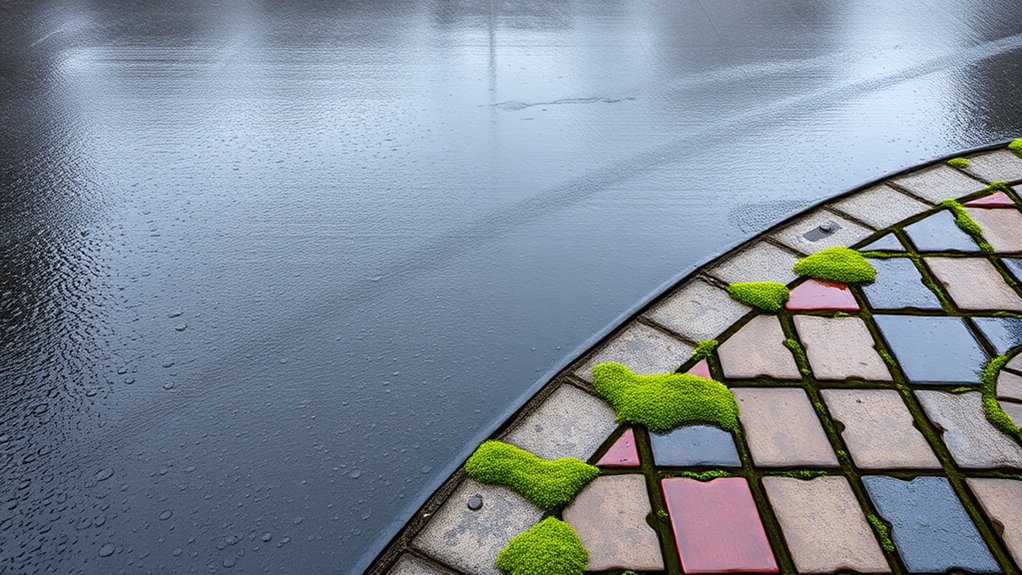
When choosing a driveway material, consider durability, maintenance, and drainage. Options like concrete and gravel offer distinct environmental benefits, especially with the UK’s frequent heavy rain. For instance, gravel allows for better drainage, reducing water pooling. Concrete driveways can last approximately 30 years with minimal maintenance, making them a practical choice for long-term use. Additionally, selecting permeable materials can further enhance stormwater management, supporting sustainability and groundwater recharge. Assessing these factors will help you find a driveway that suits both your practical needs and aesthetic preferences.
Key Material Characteristics
Choosing the right material for your driveway is crucial, particularly given the challenges of UK weather. Each type of driveway has its own advantages to suit different needs.
Tarmac is a popular option, offering a sleek black finish and low maintenance with a lifespan of 15–20 years, making it ideal for busy households.
Asphalt is even more durable, lasting 20–30 years, but can become sticky during hot weather. Asphalt is known to withstand heavy rainfall, which makes it an excellent choice for the UK climate.
For those on a budget, gravel is a cost-effective choice with quick installation, although it does require regular upkeep.
Resin-bound driveways allow for aesthetic flexibility and provide excellent drainage.
Concrete is strong enough to withstand heavy vehicles and harsh weather, but it does require good drainage to prevent issues.
Each material has its strengths, so consider what best fits your needs.
Environmental Considerations
Understanding the environmental impact of driveway materials is crucial for making an informed decision. Here’s a summary of common driveway options and their ecological effects:
| Material | Environmental Considerations |
|---|---|
| Concrete | High carbon emissions, non-permeable, resource-intensive |
| Asphalt | Made from petroleum, short lifespan, contributes to greenhouse gases |
| Permeable Concrete | Reduces water runoff, filters pollutants |
| Gravel | Highly permeable, aids groundwater recharge |
| Resin-bound Surfaces | Allows efficient drainage, environmental impact varies |
Opting for sustainably sourced materials helps minimise disruption to ecosystems and reduces your overall environmental footprint. Permeable options like gravel and resin-bound surfaces effectively manage water while promoting sustainability, making them ideal choices, especially in light of increasing rainfall in the UK. Additionally, choosing eco-friendly resin driveways can significantly enhance drainage capabilities while contributing to groundwater conservation.
Tarmac: Durability and Rain Resistance

Tarmac’s unique composition and structural features significantly boost its durability and rain resistance, making it an excellent choice for driveways in the UK.
Here are some key benefits:
- Material Composition: A blend of aggregates and high-quality bitumen forms a tough, water-resistant surface.
- Layered Construction: Larger and finer aggregates enhance drainage, reducing water build-up.
- Compaction Process: Professional installation ensures a dense surface that resists deformation and keeps water out.
- Surface Finish: A smooth finish prevents water pooling, which can lead to damage.
Tarmac can handle heavy loads and harsh weather, making it a reliable option for our rainy climate.
With regular maintenance, you can extend its lifespan and improve its rain resistance.
Resin-bound Driveways: Eco-friendly Benefits
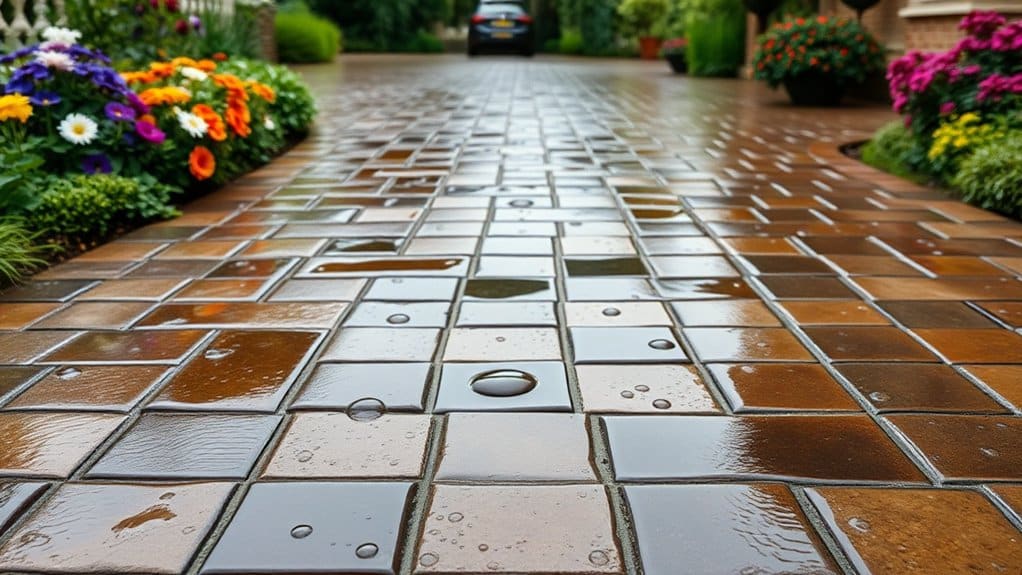
Resin-bound driveways are a sustainable option, as they allow rainwater to seep through the surface, reducing runoff and the risk of flooding.
They require minimal upkeep, saving you time and hassle as a busy homeowner.
Plus, with a variety of design options available, you can personalise your driveway to complement your home while being environmentally friendly.
Sustainable Drainage Compliance
When choosing driveway materials, it’s crucial to consider sustainable drainage compliance, particularly given the UK’s rainfall.
Resin-bound driveways provide notable benefits for managing urban flooding through effective drainage:
- Permeable Surface: This allows water to pass through, minimising surface runoff.
- SuDS Compliance: It adheres to regulations designed to manage water flow effectively.
- Natural Water Recharge: Helps replenish groundwater and supports plant growth.
- Pollution Reduction: Filters rainwater, reducing pollutants that enter local water bodies.
Opting for resin-bound driveways not only enhances your property but also contributes positively to the environment.
Low Maintenance Requirements
When selecting a driveway material that adheres to sustainable drainage regulations, maintenance needs are an important consideration.
Resin-bound driveways are a top choice, requiring very little upkeep. Simply sweep with a stiff brush weekly to remove leaves and debris. For finer dirt, a hose down or low-pressure jet wash will do the trick without harming the surface. Occasionally, a gentle scrub with eco-friendly detergent can eliminate stubborn stains—just steer clear of harsh chemicals to avoid damaging the material.
Thanks to their permeable design, resin-bound driveways significantly reduce the growth of moss and algae, which means less frequent maintenance.
With built-in weed resistance and minimal repair requirements, resin-bound driveways are an eco-friendly option that makes upkeep straightforward and sustainable.
Aesthetic Versatility Options
While many driveway materials prioritise functionality, resin driveways stand out for their aesthetic versatility and eco-friendly benefits.
With resin-bound surfaces, you can achieve impressive customisation through:
- A wide range of colours, finishes, and textures to match your home’s architectural style.
- The use of natural aggregates and decorative stones for added visual interest.
- Design flexibility that allows for personalised patterns and layouts.
- UV-stable resins that retain their colour and integrity over time, ensuring lasting appeal.
This combination of style and sustainability not only boosts your property’s curb appeal but also aligns with modern eco-conscious choices, making resin driveways an excellent option for your home.
Gravel Driveways: Cost-effectiveness and Permeability

In the UK’s often rainy climate, gravel driveways provide a cost-effective and permeable option for homeowners. The initial costs for gravel installation are low, making it an affordable choice, and the quick setup means reduced labour costs.
Gravel’s natural permeability lets rainwater drain through, which helps to minimise surface runoff and lower flood risks. This feature supports Sustainable Drainage Systems (SuDS), improving drainage on your property.
With proper installation, including a solid sub-base, you’ll ensure both stability and effective drainage. Maintenance is straightforward, requiring just occasional raking and topping up.
Plus, gravel driveways usually don’t need planning permission, saving you potential fees. Overall, gravel is a practical solution for managing water effectively in the UK’s wet weather.
Asphalt: Performance in Wet Conditions
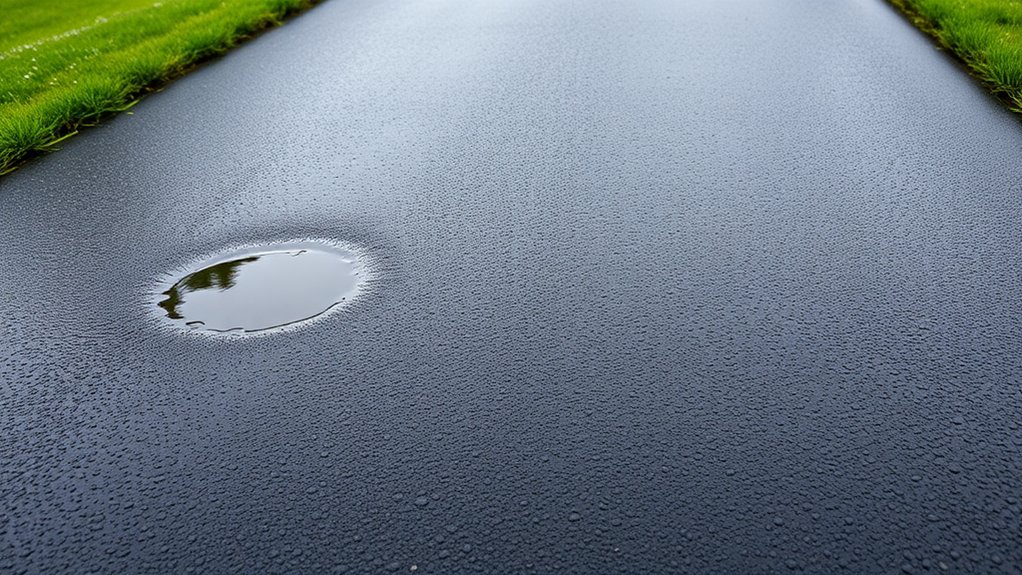
Asphalt driveways are a popular choice in the UK, so it’s important to know how they perform in wet conditions. Here are some key points to consider:
- Drying Time: Asphalt requires at least 24 hours to dry, and humid weather can extend this time.
- Impact of Rain: Heavy rainfall can wash away the binder, which weakens the asphalt.
- Drainage: Good drainage and proper grading are essential to prevent water build-up and ensure the driveway remains moisture-resistant.
- Maintenance: Regular sealing and quick repairs of any cracks are vital for prolonging the life of your driveway.
Permeable Block Paving: SUDS Compliance
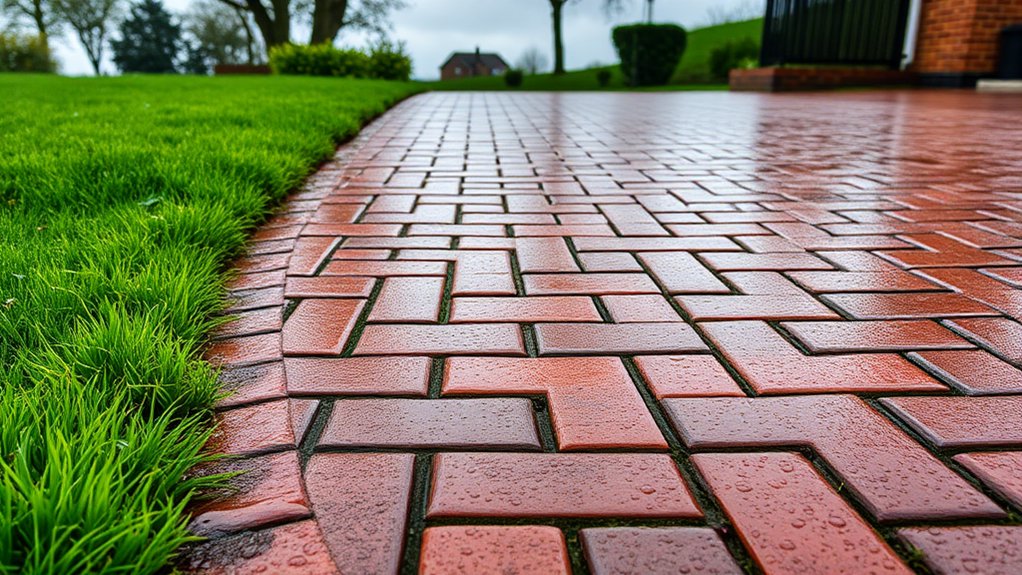
When planning a new driveway, it’s crucial to understand the Sustainable Drainage Systems (SuDS) compliance requirements in the UK. Permeable block paving provides excellent drainage benefits and meets SuDS standards, allowing you to avoid planning permission for surfaces over 5 m².
| Criteria | Benefits | Compliance Requirement |
|---|---|---|
| Water Infiltration | Reduces flood risk | Must allow water to seep through |
| Cost-Effectiveness | Lowers infrastructure costs | Complies with drainage regulations |
| Space Saving | Minimises land used for drainage | Supports on-site water management |
Before installation, check your local council’s guidelines to ensure you comply with current SuDS standards.
Maintenance Requirements for Different Materials
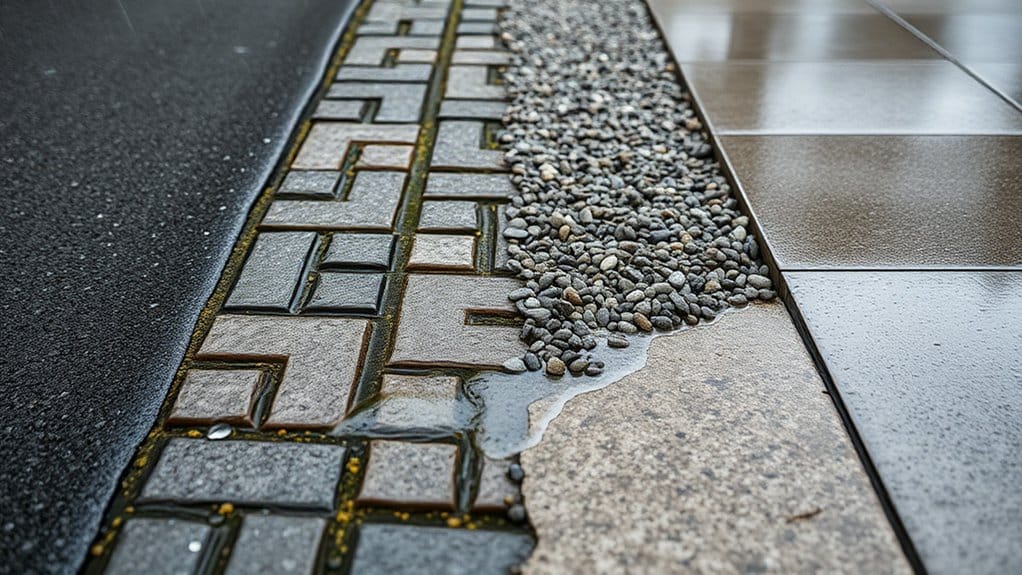
Understanding the maintenance needs of different driveway materials is crucial for their longevity and performance. Here’s a quick overview of what each type requires:
- Tarmac: Seal it every 3 to 5 years, give it a light power wash, and fill in any potholes to keep it in good shape.
- Resin: Just a periodic jet wash is enough, with minimal weed control needed. Both types are resistant to cracking.
- Gravel: Regularly rake it, remove weeds, and manage mud during heavy rain to maintain its appearance.
- Concrete: This is low maintenance but does require occasional cleaning and sealing to avoid stains and cracks.
Cost Considerations for Driveway Materials
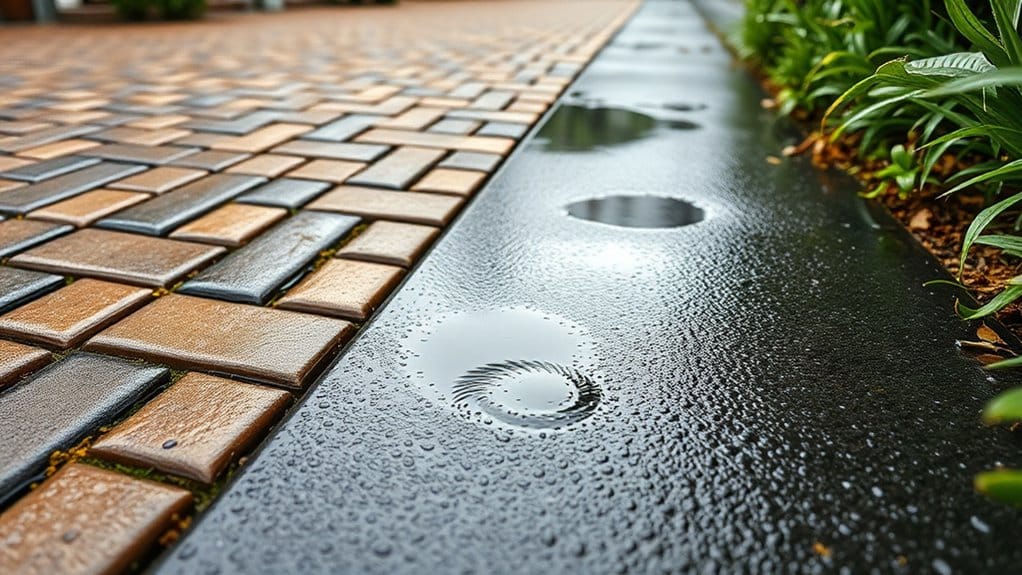
When choosing a driveway material, consider the installation costs, long-term maintenance, and the price of eco-friendly options.
Each type of material has different upfront costs and ongoing maintenance, which can affect your budget in the long run.
For example, while block paving may cost more initially, it often requires less upkeep than gravel.
Evaluating these factors will help you make a well-informed choice that balances your initial spend with future expenses.
Material Installation Expenses
Installing a driveway comes with various material and labour costs that can significantly affect your budget.
It’s important to understand these expenses to make a well-informed choice. Here are the key factors to consider:
- Material Costs: Prices can vary widely; for example, gravel is the most affordable option, while resin is on the higher end, which will influence your overall investment.
- Installation Techniques: The level of labour required differs. Block paving, for instance, is labour-intensive, whereas gravel is much easier to install.
- Material Durability: While materials like concrete and resin may have higher initial costs, their durability could save you money in the long run, as they require less maintenance.
- Site Conditions: Factors such as site access and the quality of the basework can affect both the installation costs and the techniques used.
Long-term Maintenance Costs
Long-term maintenance costs are a key factor when choosing driveway materials, particularly given the UK’s unpredictable weather.
Tarmac and resin-bound driveways require minimal upkeep, with tarmac needing resealing every 3-5 years, while resin bound typically only requires occasional jet washing. Both options can last between 15-25 years, offering good longevity with low costs.
In contrast, block paving requires moderate maintenance due to weed growth and the risk of shifting blocks, while concrete can lead to higher expenses from repairs and professional services.
Gravel driveways may seem affordable at first, but they need regular replenishment and leveling, which adds to long-term costs.
Ultimately, your decision should balance the initial investment with the ongoing maintenance requirements.
Eco-friendly Options Pricing
When selecting eco-friendly driveway materials, it’s important to consider pricing, as sustainable options can differ significantly in cost.
Here’s a brief overview to help with your budgeting:
- Gravel: Priced between £30-£60 per m², gravel is an economical choice that offers good permeability.
- Permeable Concrete: This option costs around £50-£95 per m², reflecting its durability and positive environmental impact.
- Resin Bound Gravel: With prices ranging from £60 to £200 per m², resin bound gravel provides a beautiful finish but comes at a higher cost due to the technology involved.
- Recycled Materials: The cost varies depending on local availability, generally falling within the mid-range category.
Aesthetic Appeal and Practicality of Driveway Options
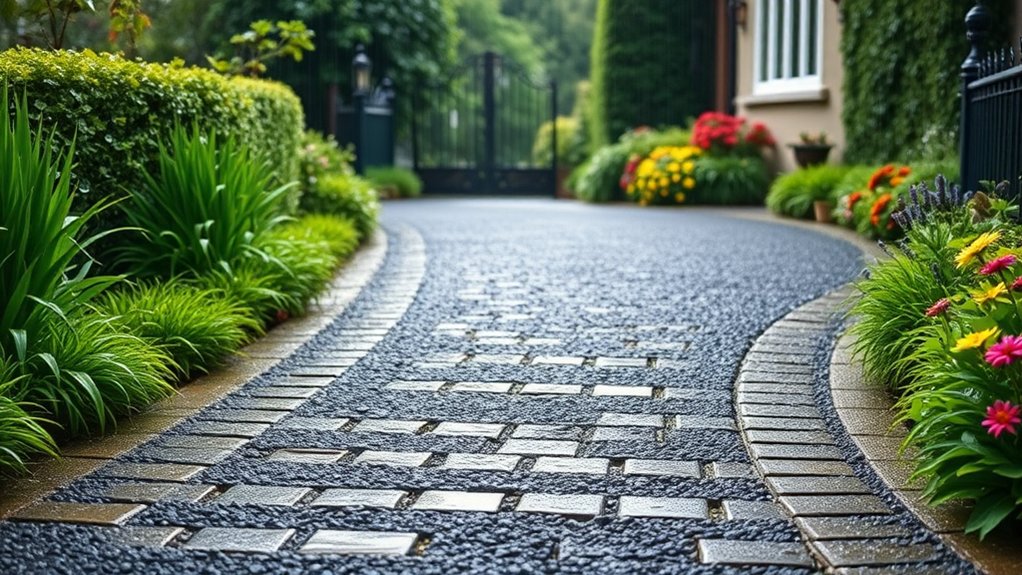
When choosing driveway materials, aesthetics are important, but practicality is crucial, especially considering the UK’s rainy climate.
Tarmac provides a sleek look but lacks customisation options, which may not fit today’s design trends.
Gravel adds colour and a rustic charm but requires regular upkeep.
Resin-bound surfaces are a great choice, offering smoothness and high customisation while providing excellent drainage.
Permeable block paving combines style and functionality, allowing rainwater to pass through while looking good.
Asphalt can also enhance its appearance with coatings, though it might need tweaks for proper drainage.
Striking a balance between aesthetics and practicality ensures your driveway can handle the UK’s weather effectively.
Frequently Asked Questions
What Driveway Material Is Best for Cold UK Winters?
For cold UK winters, asphalt is a solid choice due to its flexibility, which helps it perform well in chilly conditions. Regular sealing is important to maintain its condition. Alternatively, block paving offers durability and effective drainage, while resin-bound surfaces are low maintenance. Always follow winter care tips to ensure your driveway lasts.
How Do Driveway Materials Affect Property Value?
Driveway materials significantly impact property value through their aesthetics and curb appeal. Attractive surfaces can enhance the overall look of a property, making it more appealing to potential buyers. For instance, a well-laid block paving driveway not only looks smart but also suggests quality and care. On the other hand, durable materials like gravel or resin-bound surfaces can reduce maintenance costs, ensuring that the property remains appealing in the long run. Ultimately, investing in the right driveway material can help preserve and even boost your property’s worth.
Can I Install a Driveway Myself?
Yes, you can install a driveway yourself. With the right tools and careful planning, it’s doable. Just ensure you understand local regulations and follow proper techniques for a long-lasting finish. For example, if you’re laying block paving, make sure the ground is well-prepared and level to avoid future issues.
What Are the Best Drainage Solutions for Driveways?
For effective drainage solutions for driveways, consider using permeable paving materials. These allow rainwater to soak through, reducing surface runoff. Installing a well-designed drainage system ensures your driveway remains stable and helps prevent flooding, improving its performance during wet weather.
How Do I Choose the Right Color for My Driveway?
When selecting a colour for your driveway, think about colour psychology and how it contrasts with the materials used. Choose shades that match your home and boost its kerb appeal. Also, consider practical factors like maintenance requirements and the local climate. For example, lighter colours may show dirt more easily, while darker shades can absorb heat.
Conclusion
In the UK, where rain is a common occurrence, choosing the right driveway material is crucial. Tarmac is durable, but resin-bound driveways offer eco-friendly advantages. Gravel is cost-effective and permeable, allowing rainwater to drain through, while permeable block paving meets SUDS regulations for effective water management. Your choice will impact not just drainage but also the look and upkeep of your driveway. Consider how each option fits your needs—it’s more than just a surface; it’s a smart investment.
Beneath the surface of tarmac and asphalt driveways lies a world of differences; discover which option suits your needs best.
Choosing between a tarmac and resin driveway can be challenging; discover the key factors that could influence your decision.
Tarmac driveways can support impressive weights, but understanding the key factors will help you determine just how much yours can Read more

